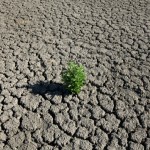Texas’ Most Hated Tree: How Drought, Wildfires Renewed Interest in Cedar Eradication

Cedar Photo courtesy flickr.com/79666107@N00 bullseye image edited by KUT News.
The Ashe juniper goes by several names.
When people complain about cedar trees in Texas, they’re usually talking about allergies: the dreaded “cedar fever” that makes life a nightmare for millions of sufferers throughout large swaths of the state. But at the Texas Capital last week, lawmakers were talking about cedars for other, very elemental, reasons: water and fire.
Ashe Junipers, commonly called “cedar trees” in Texas, do a good job of drinking one and spreading the other according to testimony before the House Committee on Agriculture and Livestock.
Some studies say mature cedars can pull about 33 gallons of water a day from the soil. With lawmakers trying to figure out how to keep water in the ground for drinking, agriculture and (let’s not forget) oil and gas drillling, the thirsty trees are being viewed as more and more of a problem.
“That water that might have been available for soil moister. And groundwater infiltration is also deteriorated,” Ken Rainwater (yes Rainwater), told StateImpact Texas.
Rainwater, the director of the Water Resources Center at Texas Tech University, gave testimony to the Committee on Cedar removal. Judging from the response of the committee it looks like those who want to eradicate cedar to save water may have found some allies in suburbanites concerned about the trees for another reason.
“They’re dangerous!” Paul Workman, the Republican State Representative from southwestern Travis County, told StateImpact Texas after the hearing.
Workman and others say the tree contributes to wildfire dangers because of the chemical make up of their wood. That’s a concern especially in the regions like Travis county where developers are building into once rural parts of the state. Workman wants to ramp up cedar removal in his district. Though that might be a challenge. The budget for the state’s brush removal program was cut by half last legislative session, and may face further cuts again next year.
“I favor putting more money into this cause it’s a water issue for me and a fire issue,” said Workman.
Less Cedar a Long Shot
But voices calling for cedar eradication may be drowned out by higher profile concerns.
The Texas State Soil and Water Conservation Board, the state agency that handles brush removal grants, is dealing with the fallout of other cuts to its budget. Those include the slashing of funds last legislative session for Texas Water Conservation Districts, and the fact that the Board doesn’t have enough money for maintenance and repairs on Texas dams.
Added to the funding challenge is the fact that not everyone agrees about the threat cedar poses.
A quick online search reveals numerous pro-cedar sites dedicated to “debunking” anti-cedar “myths.” (Here’s one example). Meaning we’ll probably be hearing more from both sides as the legislative session gets underway next January.
And that’s right around the same time as Cedar allergy season.
